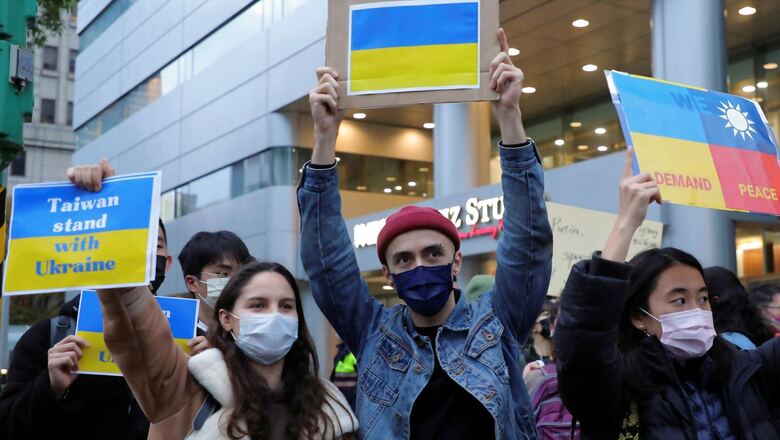
views
Russian President Vladimir Putin launched what he calls “special military operations” to “demilitarise” and “denazify” Ukraine in the early hours of February 24, 2022. The attacks were launched from the east, north and south, and the Russian troops reportedly closed in on Ukraine’s capital – Kyiv – without any hint of ceasefire. In about 48 hours, Russia had tossed aside the post-war world order and asserted itself as a major pole in the anarchic international world, from being just a declining great power.
But more importantly for Asia, the Russian invasion brings a different set of challenges as it establishes a pattern for a Taiwan invasion campaign by the People’s Republic of China (PRC). Taiwan, a self-ruled island of 23 million people, over 150 km off China’s eastern coast, has lived in the shadows of a regional power for the last seven decades. The PRC claims Taiwan to be its sovereign territory. Many analysts and scholars have drawn comparisons to Taiwan after the Russian invasion of Ukraine. While correlation is not precise, the US-Russia power confrontation over Ukraine definitely underlines the strategic calculus for the future of US-China relations and the cross-strait geopolitics.
How Has Taiwan Reacted to Russia’s Ukraine Invasion?
Anticipating Russia’s aggression, Taiwan’s President Tsai Ing-wen ordered her National Security Council on January 28 to set up a task force to study how the confrontation might play out amid escalating tensions between Ukraine and Russia. “Taiwan has faced military threats and intimidation from China for a long time,” she reportedly said to a gathering of her national security advisers late last month.
After the beginning of the invasion, Taiwan condemned the Russian aggression and called on all parties to resolve the dispute peacefully and rationally. The spokesperson of Taiwan’s Ministry of Foreign Affairs (MOFA), Joanne Ou, said that Russia’s unilateral actions not only violate Article 2, Paragraph 4 of the United Nations Charter but also undermine the efforts of the international community to actively seek a peaceful resolution to the Russian-Ukrainian crisis through diplomatic means.
Tsai and Taiwan’s Executive President Su Zhenchang were also briefed by Taiwan’s National Security Council (NSC) and relevant ministries on the Ukraine Situation Response (wūkèlánjúshìyìngduì). The government put forward four instructions – including the response to military developments in the Taiwan Strait – post the NSC briefings. Within Tsai’s administration, tensions have been viewed with increasing urgency, and the task force has been instructed to monitor and submit regular reports on the escalating situation in Ukraine.
Furthermore, the Taiwanese Presidential Office spokesperson said the situation in Taiwan and Ukraine are fundamentally different in terms of geo-strategy, geographical environment, and the importance of the international supply chain. However, “in the face of foreign forces intending to manipulate the situation in Ukraine and affecting the morale of Taiwanese society, all government units must strengthen prevention. Foreign forces and local collaborators have launched cognitive operations, and we need to strengthen the clarification of misinformation to stabilise the internal situation in the society,” the spokesperson added, hinting at China’s information warfare campaigns.
ALSO READ | War in Ukraine: For India, It Will No Longer be Business as Usual with Russia or US
Unlike its western neighbour – the People’s Republic of China – which is ready to bail Russia out economically, Taiwan is contemplating banning the export of semiconductor products to Russia. Its total trade with Russia is minuscule, with exports accounting for 0.3 per cent and imports accounting for 1.3 per cent of the total trade. However, its participation in the sanctions regime with the West symbolises its courage and conviction towards universal internationalist values, like principles of sovereignty, territorial integrity and non-interference. It also highlights the geopolitical situation in East Asia because bandwagoning with the US is crucial for Taiwan’s own survival in the future.
Earlier in 2014, Taiwan had opposed Russia’s annexation of Crimea. The latest Russian aggression, however, worries Taiwan as Chinese President Xi Jinping is reforming the country’s armed forces and has claimed that “complete reunification of the motherland is a historic task and must be fulfilled”. Notably, unlike earlier, Xi’s speech categorically highlighted “reunification with Taiwan” instead of “peaceful reunification with Taiwan”.
Taiwan’s Concerns
Broadly, there are a couple of aspects that should worry Taiwan. First, the Russian invasion of Ukraine can be a prototype for China’s Taiwan reunification campaign. Multiple Chinese scholars have claimed that the Taiwan issue and Russian invasion are not comparable as the former is “China’s internal affair” and later resembles a geopolitical issue within the great power contest. However, like Taiwan, the PRC is watching the West’s response closely. Failure of the US and its allies to respond to Russian aggression could further embolden Xi and his comrades to perhaps engage in similar campaigns across the Taiwan Strait before August 1, 2027, when the Chinese People’s Liberation Army celebrates its centenary.
Similarly, the ‘US Pivot to Asia’, which the Obama administration introduced, aimed to re-energise the American diplomatic, military and economic focus on the Indo-Pacific region and contain China’s rise. However, the recent crisis can temporarily pull the US back in Europe, allowing the PRC to fill the vacuum. This means China would have a relatively free pass to explore its hegemonic aspirations in the Indo-Pacific region, especially in East and Southeast Asia and the Indian Ocean Region.
This would imply that the balance of power around the Taiwan Strait, East Asia and the Indo-Pacific region, which is already shifting, would change drastically, pushing the region into a dangerous new phase of uncertainty for the next few years.
Suyash Desai is a research scholar studying Chinese defence and foreign policies. He is currently undergoing traditional Chinese language training at National Sun Yat-sen University, Kaohsiung, Taiwan. The views expressed in this article are those of the author and do not represent the stand of this publication.
Read all the Latest Opinion News and Breaking News here
















Comments
0 comment